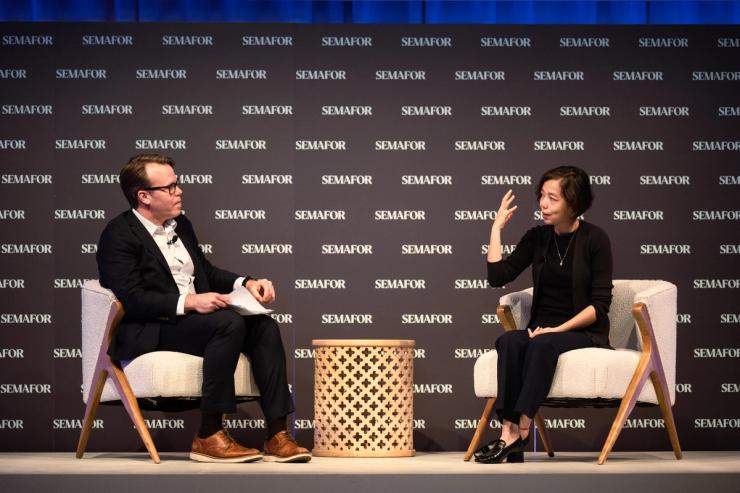The News
Fei-Fei Li, the leading Stanford University researcher nicknamed the “godmother of AI,” emphasized the risks of cutting research funding and international student visas to the US as it faces an increasingly competitive global tech race.
“The public sector, especially higher education, has been a pivotal, central part of America’s innovation ecosystem [and] a critical part of our economic growth,” she said at a Semafor Tech event in San Francisco on Wednesday. “Almost everything we know as classic knowledge of AI came from academic research, whether its algorithms, data-driven methods, or early research in microprocessors.”
Her comments come as the Trump administration has targeted billions of dollars in grants for universities because of their social policies and revoked thousands of visas for students as part of its crackdown on immigration.
Li, who is co-director of the Stanford Institute Human-Centered AI and the co-founder of the World Labs startup, is revered in the tech sector because of her early breakthroughs in artificial intelligence, and she’s been a leading voice on policies to promote innovation.
“Continuing to nourish our higher education, our public sector, for this kind of innovative, blue sky, curiosity-driven research is critical for the health of our ecosystem [and] for training the next generation,” she said. “I hope [my students] can get work visas and have a path for immigration.”
She added that US visa quotas for individuals from certain countries “has been a challenge for many talents to stay, and I hope we can continue to address that.”
Know More
Speaking at the same event on Wednesday, Anthropic co-founder Jack Clark added that the Trump administration recognizes the importance of AI, but its strategy is still coming together, including its plan around export controls.
“The challenge of AI is it touches everything — electricity generation, export controls, how you do the structuring of science and research,” Clark said. “This administration has gone through the pattern of coming and saying, ‘Oh wow, we’ve got this cool technology. It’s called AI.’ And then they discover very quickly that this technology touches every single thing they care about. It will eventually form into — I hope — a larger, more coherent strategy.”
Clark also noted the increasing tension reflected in the Trump administration’s recent decision to expand access to advanced chips to the UAE and Saudi Arabia. The region had been limited under the Biden administration, which put caps on its semiconductor purchases from American companies.
On one hand, Clark said, there’s a push for the world to use US-led AI platforms and build on US chips. But if the technology becomes as incredibly powerful as predicted, products built on it will have dual uses that could have nefarious purposes.
“All of those computers all around the world are going to become equivalent to factories that can turn out both cars and tanks,” he said. “And you are going to see which way it goes depending on what the alliance looks like. So we are going to need to think about how we apply really good security to these factories that we’ve now built all around the world.”
Director of the Center for AI Safety Dan Hendrycks, who is also an advisor at Elon Musk’s AI startup, xAI, and for Scale AI, also pointed to export controls as a safety mechanism.
“Chips are sort of the currency of power in AI. It’s over 90% of these AI companies’ budget is spent on,” Hendrycks said at the event. “And making sure that that isn’t falling in the hands of rogue actors, or pariah states, is a priority.”
The View From

The pace of technological innovation today is unmatched — redefining how consumers and businesses connect, operate, and engage with the world around them. At Booking.com, we’re embracing this momentum to transform how people search for, book, and experience travel, and advance further on our mission to make it easier for everyone to experience the world. As a global leader in online travel, we understand that thriving in the AI era — much like in travel — requires adaptability, agility, and the relentless pursuit of exploring new horizons.
Across industries, AI holds the potential to streamline processes, enhance decision-making, and raise the bar to meet growing customer expectations. Pairing AI’s capabilities with rich, trusted data and the talent to think differently will be key to turning that potential into lasting value. We are committed to investing, learning, and collaborating to unlock limitless opportunities ahead because at Booking.com, we’re not just planning for the next evolution of travel, we’re building it.


